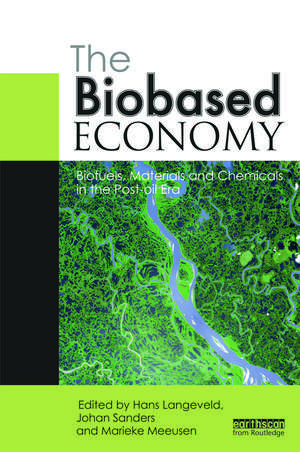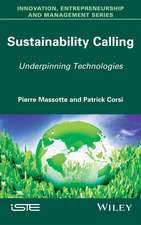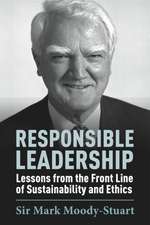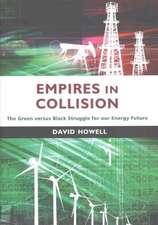The Biobased Economy: Biofuels, Materials and Chemicals in the Post-oil Era
Editat de Hans Langeveld, Johan Sanders, Marieke Meeusenen Limba Engleză Paperback – 21 mai 2012
This groundbreaking work, edited by a group of leading researchers originally from Wageningen Agricultural University in the Netherlands, sets out to unpick the complex systems in play. It provides an illuminating framework for how policy and market players could and should drive the development of a biobased economy that is effective, sustainable, fair and cost efficient. Starting with a state-of-the-art overview of major biobased technologies, including biorefinery and technologies for the production of biofuels, biogas, biomass feedstocks for chemistry and bioplastics, it discusses how different actor groups interact through policy and markets. Information from case studies is used to demonstrate how the potential of the biobased economy in different parts of the world, such as North America, Europe, and emerging economies like China and Brazil can be realised using research, debate, policy and commercial development. The result is an essential resource for all those working in or concerned with biobased industries, their policy or research.
Preț: 457.14 lei
Nou
Puncte Express: 686
Preț estimativ în valută:
87.47€ • 91.57$ • 72.38£
87.47€ • 91.57$ • 72.38£
Carte tipărită la comandă
Livrare economică 05-19 aprilie
Preluare comenzi: 021 569.72.76
Specificații
ISBN-13: 9780415631327
ISBN-10: 0415631327
Pagini: 416
Ilustrații: 56 black & white illustrations, 27 black & white tables, 2 black & white halftones
Dimensiuni: 156 x 234 x 23 mm
Greutate: 0.64 kg
Ediția:1
Editura: Taylor & Francis
Colecția Routledge
Locul publicării:Oxford, United Kingdom
ISBN-10: 0415631327
Pagini: 416
Ilustrații: 56 black & white illustrations, 27 black & white tables, 2 black & white halftones
Dimensiuni: 156 x 234 x 23 mm
Greutate: 0.64 kg
Ediția:1
Editura: Taylor & Francis
Colecția Routledge
Locul publicării:Oxford, United Kingdom
Cuprins
Part 1: Towards Sustainability 1. General Introduction 2. Transition Towards a Biobased Economy 3. Challenges for Sustainable Development 4. Principles of Plant Production 5. Plant Breeding and its Role in a Biobased Economy 6. Biomass Availability Part 2: Biomass Refining and Conversion 7. Biorefineries: Giving Value to Sustainable Biomass Use 8. Plant Production of Chemical Building Blocks 9. The Production of Chemicals in a Biobased Economy 10. Advanced Biofuels from Lignocellulosic Biomass 11. Biogas Part 3: Actor Involvement 12. Policy Making for the Biobased Economy 13. Biobased Industrialization in Developing Countries 14. Biobased Production Chains 15. Biofuel Policies, Production, Trade and Land Use 16. Public Debate on Sustainability of Biofuels Part 4: Transition in Action 17. Biodiesel from Brazil 18. Biobased Products and Bioenergy in Germany 19. Development of the Biobased Economy in Canada: An Overview 20. A Biobased Economy for the Netherlands 21. Synthesis
Notă biografică
Hans Langeveld is Director of Biomass Research, a research and consulting firm focussing on the development and evaluation of biobased and bioenergy production. He has a background in applied agronomic and economic research and combines a pragmatic approach with a clear analytical view. The main focus of his work is feedstock availability and sustainability (GHG emissions and land use change), market analysis and production development of biobased and decentral bioenergy production chains. Formerly, he was Senior Researcher at Plant Research International, Wageningen University and Research Centre, and Researcher at the Centre for World Food Studies of the Free University Amsterdam, both in the Netherlands. He has been project leader of a number of large bioenergy projects and is (co-)author of over 50 scientific papers as well as books on the biobased economy and on dynamics of European farming systems.
Johan Sanders is Professor of Valorisation of Plant Production Chains at Wageningen University, and Research Leader in the Department of Agrotechnology and Food Sciences, both at Wageningen University and Research Centre. He has held several research and management positions at leading agro-chemical industries in the Netherlands where he developed a unique vision on the application of biorefinery technologies and development of a biobased economy for the Netherlands.
Marieke Meeusen is Senior Researcher in Sustainable Agricultural Chains in the Agricultural Economics Research Institute, Wageningen University and Research Centre, where she is Deputy Head of the Markets and Networks section, and leading a research programme on biobased economy. She is author of several studies on bioenergy and biobased economy.
Johan Sanders is Professor of Valorisation of Plant Production Chains at Wageningen University, and Research Leader in the Department of Agrotechnology and Food Sciences, both at Wageningen University and Research Centre. He has held several research and management positions at leading agro-chemical industries in the Netherlands where he developed a unique vision on the application of biorefinery technologies and development of a biobased economy for the Netherlands.
Marieke Meeusen is Senior Researcher in Sustainable Agricultural Chains in the Agricultural Economics Research Institute, Wageningen University and Research Centre, where she is Deputy Head of the Markets and Networks section, and leading a research programme on biobased economy. She is author of several studies on bioenergy and biobased economy.
Recenzii
''Readable, well organized and highly informative - a fine piece of work'' – Ton Runneboom, Chairman, Bio-renewable Resources Platform
''It may be optimistic to expect everyone to read a book like this, but the debate would be more civilized and the marriage of technologies and policies would be happier if they did ... The overarching point is to strive for a transition that is technically, economically, and socially worthwhile.This book is an important step in that direction'' – Crosslands Bulletin
''Very easy to read for specialists and non-specialists alike... [the] book is a good source of knowledge for all who may be interested in learning about the paradigm shift that is in the making and that is likely to impact our lives significantly'' – Biofuels and Products Research
''Very useful' – Jos Moreira, director of the Brazilian Reference Center on Biomass (CENBIO), University of Sao Paulo, Brazil
''Large-scale biomass use is currently hotly debated. The Biobased Economy shows that it is possible to overcome the risks by introducing more efficient, innovative, uses of biomass, based on the refining of biomass, providing input for chemicals, feed and energy. These novel routes have the potential to improve the efficiency of biomass application per unit of land by at least a factor 3. Based on a detailed discussion of the technological, environmental and policy aspects that are involved in making the transition, the book convincingly shows that a transition to a biobased economy can facilitate the replacement of fossil fuels by biomass in our societies. This might be an essential step in managing the problem of climate change'' – Detlef van Vuuren (PhD), Netherlands Environmental Assessment Agency (PBL), and a Lead Author of the IPCC's Fourth Assessment Report
''This book is extremely important'' – Green Energy Magazine
''This book written by renowned scientist from different fields is a valuable source of information for all people interested in the ways we can protect the Earth and enhance our future, solving an essential problem for the humanity- the dependence of the conventional fuel'' – IASI Polytechnic Magazine
''This volume contains many chapters that are interesting and kinder to general readers than the more specialized chapter'' – D.D. Miller, Choice Magazine, October 2010
''It may be optimistic to expect everyone to read a book like this, but the debate would be more civilized and the marriage of technologies and policies would be happier if they did ... The overarching point is to strive for a transition that is technically, economically, and socially worthwhile.This book is an important step in that direction'' – Crosslands Bulletin
''Very easy to read for specialists and non-specialists alike... [the] book is a good source of knowledge for all who may be interested in learning about the paradigm shift that is in the making and that is likely to impact our lives significantly'' – Biofuels and Products Research
''Very useful' – Jos Moreira, director of the Brazilian Reference Center on Biomass (CENBIO), University of Sao Paulo, Brazil
''Large-scale biomass use is currently hotly debated. The Biobased Economy shows that it is possible to overcome the risks by introducing more efficient, innovative, uses of biomass, based on the refining of biomass, providing input for chemicals, feed and energy. These novel routes have the potential to improve the efficiency of biomass application per unit of land by at least a factor 3. Based on a detailed discussion of the technological, environmental and policy aspects that are involved in making the transition, the book convincingly shows that a transition to a biobased economy can facilitate the replacement of fossil fuels by biomass in our societies. This might be an essential step in managing the problem of climate change'' – Detlef van Vuuren (PhD), Netherlands Environmental Assessment Agency (PBL), and a Lead Author of the IPCC's Fourth Assessment Report
''This book is extremely important'' – Green Energy Magazine
''This book written by renowned scientist from different fields is a valuable source of information for all people interested in the ways we can protect the Earth and enhance our future, solving an essential problem for the humanity- the dependence of the conventional fuel'' – IASI Polytechnic Magazine
''This volume contains many chapters that are interesting and kinder to general readers than the more specialized chapter'' – D.D. Miller, Choice Magazine, October 2010
Descriere
Providing an illuminating framework as to how policy and market players could and should drive the development of a biobased economy that is effective, sustainable, fair and cost efficient. The result is an essential resource for all those working in or concerned with biobased industries, their policy or research.











